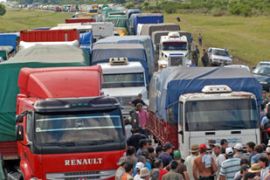Argentine farmers resume protest
Talks with government over export-tax increase breaks down after just five hours.

Published On 1 Apr 2008
Protest to stay
“Since farmers and livestock producers have not had an answer to their complaints … we have decided to continue with protest measures,” the country’s four big agro-industrial groups said in a joint statement.
They said they would talk with the government on Monday but that the protest would remain in place at least until Wednesday.
| Argentina’s economic woes |
 Although rich in natural resources, Argentina’s 39.5 million population has suffered in several economic crises in recent decades Fiscal deficits, high inflation and mounting debts culminated in 2001’s economic crisis, which sparked protests, currency devaluation and debt defaults Sixty per cent of Argentinians were also pushed below the poverty line C ountry’s main exports include soybeans, corn, wheat, petroleum, gas and vehicles Inflation is currently in double figures and farmers say recent tax increases on goods such as soybeans, sunflower oil and beef by up to 45 per cent to boost revenues will cripple their livelihoods Source: CIA World Factbook |
There was no immediate response from the government, which has repeatedly refused to meet the farmers while they are blocking transportation of farm goods.
The strike was suspended on Friday night after Kirchner called for talks over their concerns about the increase of taxes on soya bean exports from 35 to 44.1 per cent.
Half of Argentina’s fertile farmland is used for soya bean cultivation, and the country is the biggest soya exporter in the world, sending $13bn worth annually to China, India, Southeast Asia and Europe.
During the brief truce farmers allowed trucks with agricultural products to circulate and began negotiations at the government palace.
But after five hours the negotiations ended in failure and the groups ordered a resumption of the protest that has paralysed exports from Argentina, a top world supplier of soya bean, corn, wheat and beef.
Kirchner and other ministers had labelled the farmers “extortionists”, and claimed that sky-high commodities prices on the world market, coupled with Argentina’s devalued peso, have made many rural landowners very wealthy.
But farmers complain the tax increase, combined with income taxes, transport costs and the high cost of land, would push many of them out of business.
Source: News Agencies